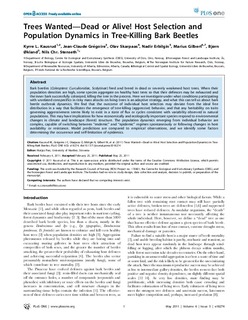Trees Wanted—Dead or Alive! Host Selection and Population Dynamics in Tree-Killing Bark Beetles
Kausrud, Kyrre Linné; Grégoire, Jean-Claude; Skarpaas, Olav; Erbilgin, Nadir; Gilbert, Marius; Økland, Bjørn; Stenseth, Nils Christian
Journal article, Peer reviewed
Published version
Permanent lenke
http://hdl.handle.net/11250/2505896Utgivelsesdato
2011-05-25Metadata
Vis full innførselSamlinger
Originalversjon
10.1371/journal.pone.0018274Sammendrag
Bark beetles (Coleoptera: Curculionidae, Scolytinae) feed and breed in dead or severely weakened host trees. When their population densities are high, some species aggregate on healthy host trees so that their defences may be exhausted and the inner bark successfully colonized, killing the tree in the process. Here we investigate under what conditions participating with unrelated conspecifics in risky mass attacks on living trees is an adaptive strategy, and what this can tell us about bark beetle outbreak dynamics. We find that the outcome of individual host selection may deviate from the ideal free distribution in a way that facilitates the emergence of tree-killing (aggressive) behavior, and that any heritability on traits governing aggressiveness seems likely to exist in a state of flux or cycles consistent with variability observed in natural populations. This may have implications for how economically and ecologically important species respond to environmental changes in climate and landscape (forest) structure. The population dynamics emerging from individual behavior are complex, capable of switching between “endemic” and “epidemic” regimes spontaneously or following changes in host availability or resistance. Model predictions are compared to empirical observations, and we identify some factors determining the occurrence and self-limitation of epidemics. Trees Wanted—Dead or Alive! Host Selection and Population Dynamics in Tree-Killing Bark Beetles

